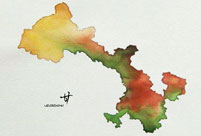Barclays Bank, one of the world’s largest commodities trader, plans to pull out of trading in base metals, energy and agricultural products, and fold its precious-metals business into its currency-trading unit, as part of an effort to shrink its investment bank and improve returns.
Morgan Stanley, Deutsche Bank, UBS and Royal Bank of Scotland have already reduced or halted their commodities business. The above five dealers once controlled about 70 percent of global commodities trading volume.
Meanwhile, some financial institutions and businesses in emerging economies are seizing the opportunity to acquire the commodities trading units of those European and American banks. Emerging economies are occupying the seats, getting more involved in rule-making, and gaining a greaters say in the action. However, lack of international operations experience means that emerging economies will face higher risks in the market.
Declining trading profits is believed to be the direct cause of the exit of a number of U.S. and European banks from commodities trading in recent years. Analysts list three main reasons for the decline in commodity prices:
1. Lack of momentum in global economic growth. The emerging economy has limited demand for commodities due to the slowdown of its own economic growth.
2. Increasing supply of commodities. The United States of America, the largest energy consumer in the world, has vigorously developed shale gas fracking, reshaping the world’s energy supply and demand patterns
3. Development of low energy consumption and low-emission industries has become a global trend, curbing demand for commodities to some extent.
Now, emerging economies such as China and Russia are occupying the space in commodities trading, and striving for a greater say in the action.
The London Metal Exchange approved BOCI Global Commodities (UK) Ltd, the international arm of Bank of China Ltd as its first Chinese member on April 2012. BOCI was approved for associate broker clearing membership, whereby members do not have access to ring trading, but can access the market by phone or electronically. In addition Guangzhou-based GF Securities, one of the mainland's ten largest securities firms, acquired the London-based commodities trading unit of French bank Nataxis for 36 million US dollars on August, 2013.
The U.S. and European exit from commodity trading offers opportunities to emerging markets, according to Gu Qingyang, associate professor of Lee Kuan Yew School of Public Policy, National University of Singapore.
Gu said that the participation of the emerging economies is not only conducive to keeping commodity prices within a reasonable range, which is determined by supply and demand, but also to regulating the market and keeping it in good order.
As China and other emerging markets take part in rule-making and gain more say in commodities trading, at the same time they meet a growing demand for commodities.
Zhang Yumin, researcher of Ministry of Commerce said that it is a positive change that emerging economies are becoming actively involved in commodity trading. The financial industries of emerging economies are becoming more open and dynamic, but it is also the case that financial institutes in emerging markets still face high risks due to a lack of international operational experience and shortage of brain power.
The article is edited and translated from《全球大宗商品市场加速洗牌》, source: People’s Daily, author: Li Ning.
 Hand-painted maps go viral online; painter's name remains unknown
Hand-painted maps go viral online; painter's name remains unknown 4th Beijing Int'l Film Festival ends
4th Beijing Int'l Film Festival ends Commando elite specializes in sign language
Commando elite specializes in sign language Man photoshops himself into girlfriend's childhood photos
Man photoshops himself into girlfriend's childhood photos Photo story: Stallholders at Beijing Zoo Wholesale Market
Photo story: Stallholders at Beijing Zoo Wholesale Market Artists on backstage
Artists on backstage Beckham launches fund to support youth soccer in China
Beckham launches fund to support youth soccer in China Cherry blossoms hit peak bloom in Washington D.C.
Cherry blossoms hit peak bloom in Washington D.C. Children in ancient costumes learn Zhusuan
Children in ancient costumes learn Zhusuan Cute Shaolin boy melts the hearts of millions
Cute Shaolin boy melts the hearts of millions Giant panda Sijia is back to happy life
Giant panda Sijia is back to happy life Richest Chinese of 2014: half from the mainland
Richest Chinese of 2014: half from the mainland Chengdu - laid-back lifestyle makes happiest city
Chengdu - laid-back lifestyle makes happiest city The backstage of the Fashion Week
The backstage of the Fashion Week College students in Han costumes
College students in Han costumesDay|Week|Month